Persimmons may help support heart health, digestion, and immune function due to their rich nutrient and antioxidant profile. This brightly colored autumn fruit is packed with fiber, vitamins A and C, and plant-based compounds that support overall wellness. Understanding the nutritional and scientific benefits of persimmons helps you include them wisely in a balanced diet. In this guide, we’ll explore evidence-based health benefits, nutrition facts, safe use, and expert-backed tips for storage and consumption.
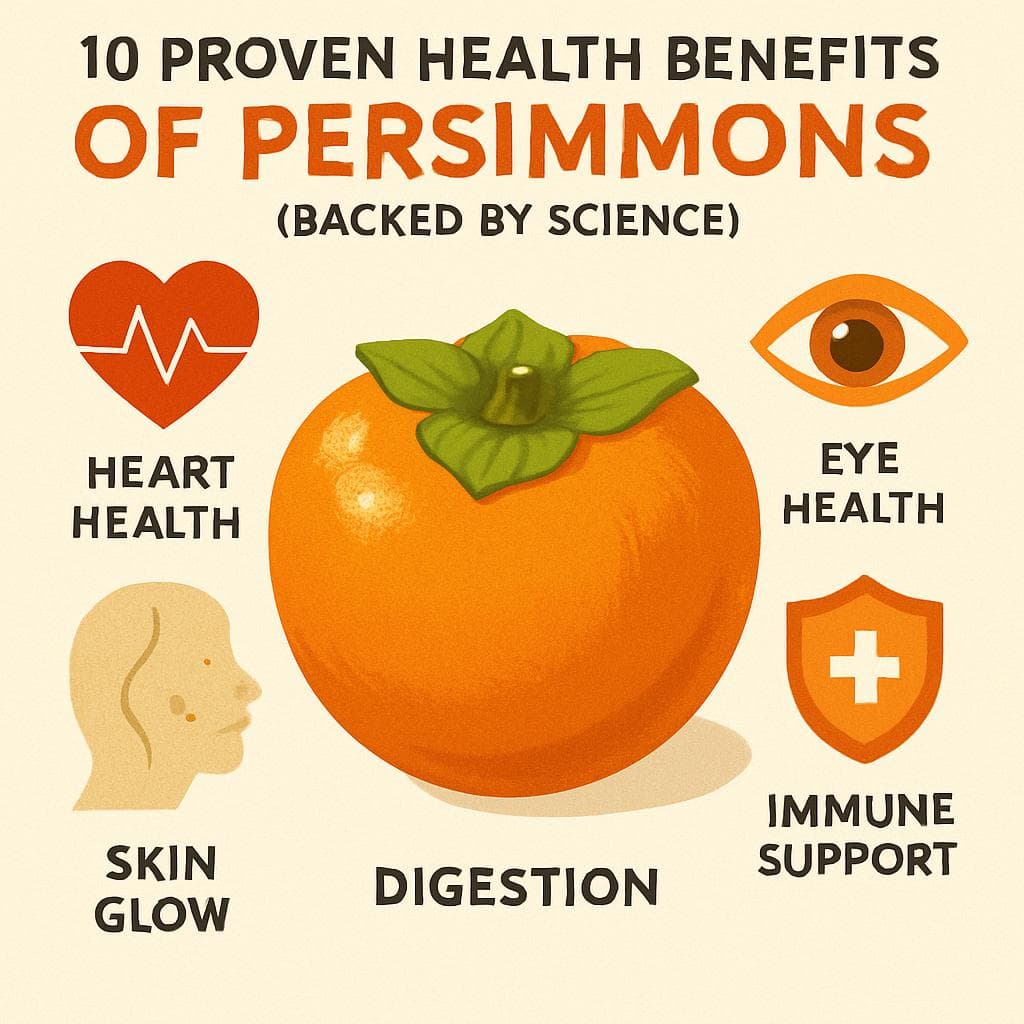
What Are Persimmons? (Overview and Nutrition Profile)
Persimmons (Diospyros kaki) are bright orange, honey-flavored fruits native to East Asia and now widely cultivated in the United States—particularly in California. They belong to the Ebenaceae family and are valued for their sweet flavor, smooth texture, and rich supply of antioxidants and dietary fiber.
There are two main edible types:
- Fuyu (non-astringent): Can be eaten firm, like an apple, with mild sweetness and low tannin content.
- Hachiya (astringent): Must be fully soft before eating to avoid the dry, puckering taste caused by natural tannins.
Both varieties are packed with vitamins A and C, potassium, and beneficial plant compounds that support overall wellness and immune function.
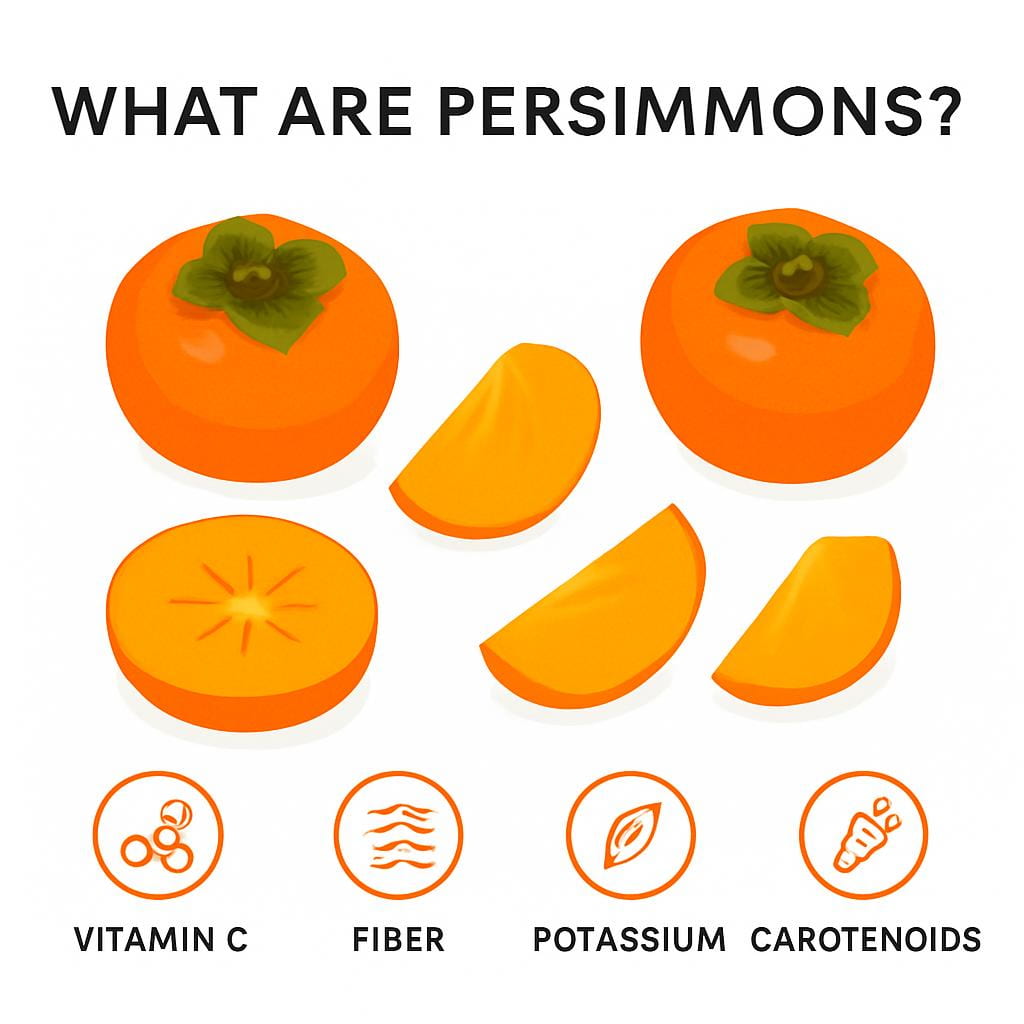
Nutrition Profile (Per 1 Medium Japanese Persimmon ~168 g, USDA 2025)
| Nutrient | Amount | % Daily Value (DV) |
|---|---|---|
| Calories | 118 kcal | — |
| Carbohydrates | 31 g | — |
| Dietary Fiber | 6 g | 21 % |
| Vitamin C | 12.6 mg | 14 % |
| Vitamin A (as β-cryptoxanthin + β-carotene) | 81 µg RAE | 9 % |
| Potassium | 270 mg | 6 % |
| Manganese | 0.6 mg | 26 % |
(Source: USDA FoodData Central, 2025)
Persimmons are low in fat and sodium yet rich in antioxidants and fiber, making them a nutrient-dense choice for heart, digestive, and immune health. Their combination of soluble fiber, potassium, and provitamin A carotenoids contributes to balanced nutrition when included as part of a varied, plant-forward diet.
10 Proven Health Benefits of Persimmons (Backed by Science)
Persimmons are more than just a seasonal delicacy — they’re rich in fiber, antioxidants, vitamins, and minerals that support heart, digestive, and immune health. Modern research confirms that this colorful fruit offers real wellness benefits when enjoyed as part of a balanced diet.
1. Supports Heart Health

Persimmons are high in soluble fiber and polyphenolic antioxidants, both of which may help support cardiovascular health.
A 2023 randomized controlled trial published in Frontiers in Nutrition found that tannin-rich persimmon fiber significantly reduced LDL (“bad”) cholesterol levels and improved lipid profiles after 12 weeks of daily intake.
Additionally, persimmons are a source of potassium (about 270 mg per fruit), which helps maintain normal blood pressure and electrolyte balance. According to the American Heart Association, potassium helps offset the effects of sodium and supports healthy circulation.
2. Rich in Antioxidants
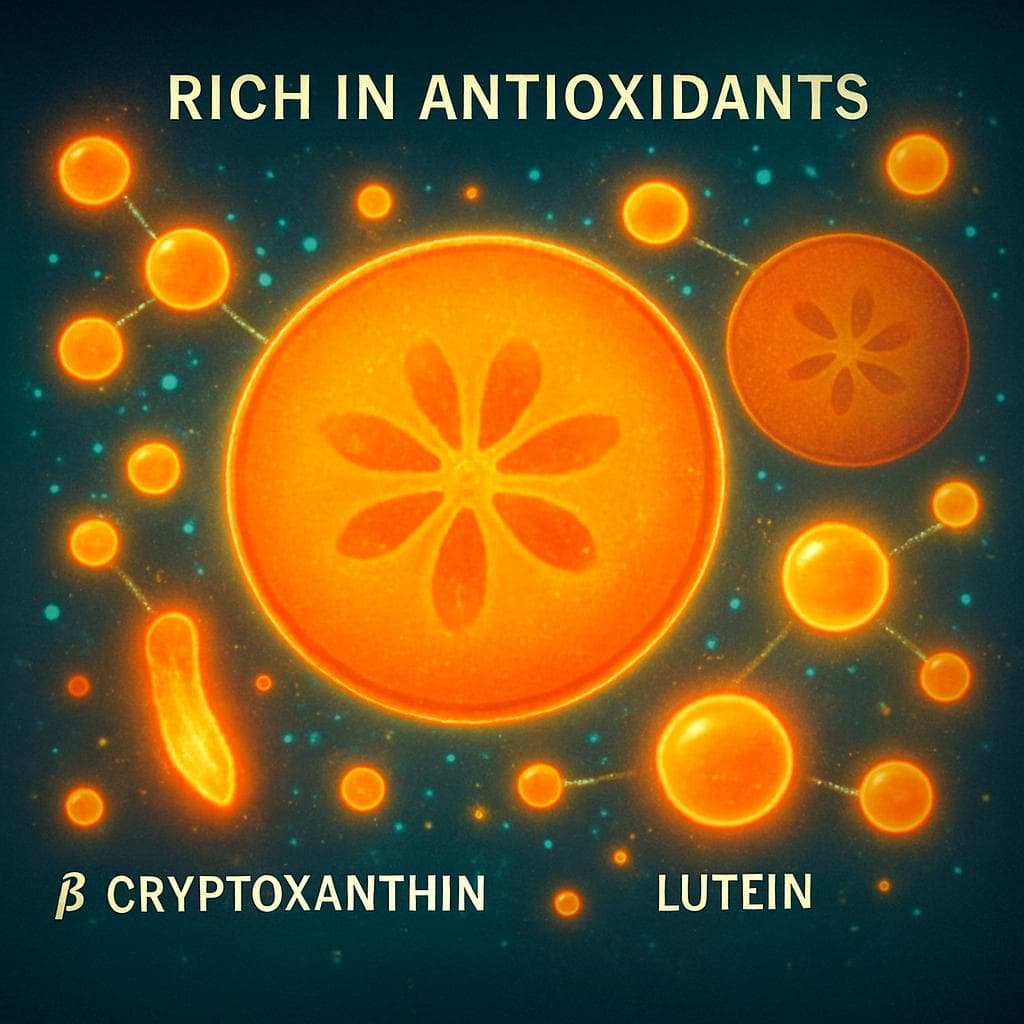
Persimmons are loaded with carotenoids (β-cryptoxanthin, lutein, zeaxanthin) and polyphenolic tannins, which help neutralize harmful free radicals.
Research published in MDPI Nutrients (2024) shows that these compounds contribute to antioxidant capacity, supporting overall cellular function and helping protect against oxidative stress that contributes to chronic diseases and premature aging.
Including antioxidant-rich foods like persimmons, berries, and citrus fruits in your diet supports long-term wellness and skin vitality.
3. May Support Digestive Health
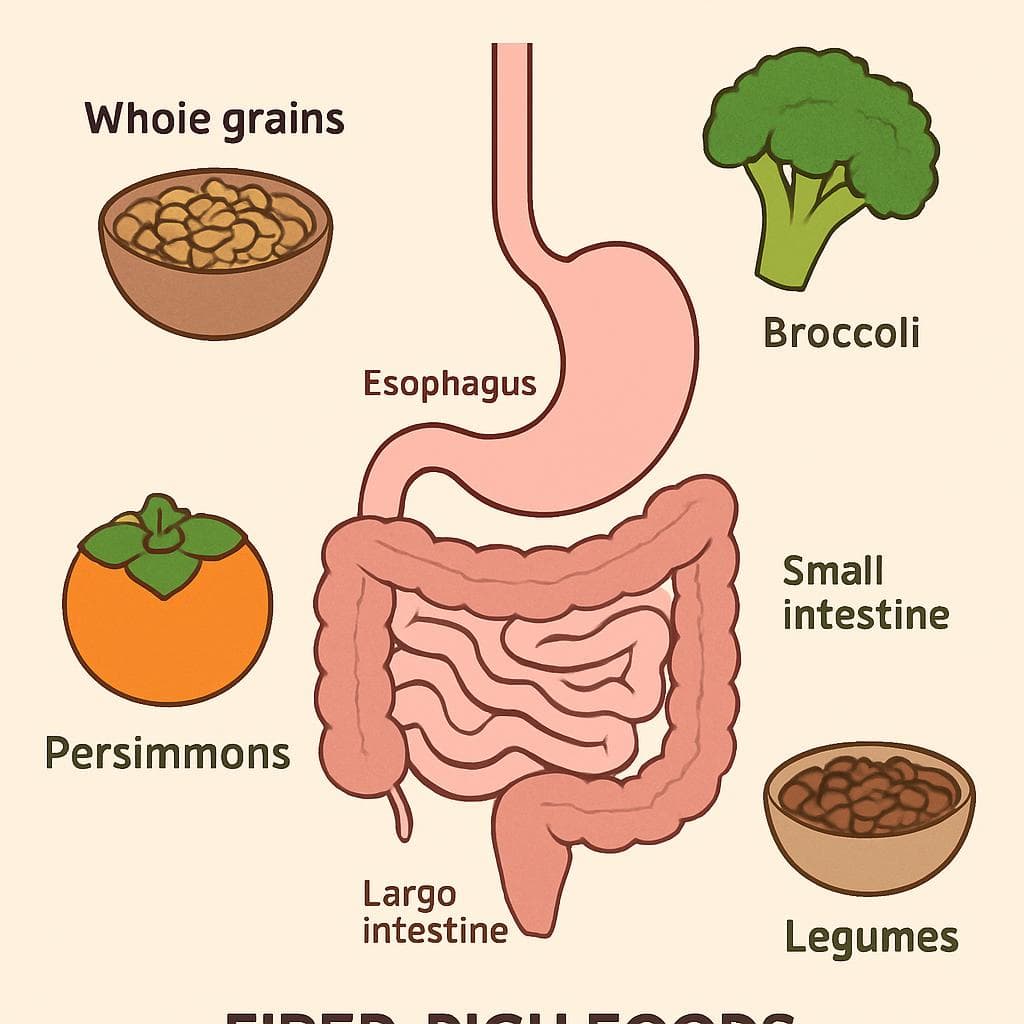
Each medium persimmon provides around 6 grams of dietary fiber, which supports healthy digestion and bowel regularity. The soluble fiber in persimmons absorbs water to form a gel-like substance, helping to soften stool and promote gut comfort.
According to the Harvard T.H. Chan School of Public Health, fiber-rich diets are linked to improved digestive health, reduced constipation, and a lower risk of colon-related complications.
Avoid unripe astringent persimmons (like Hachiya), as their high tannin content can cause temporary constipation or gastrointestinal discomfort.
4. Supports Immune Function
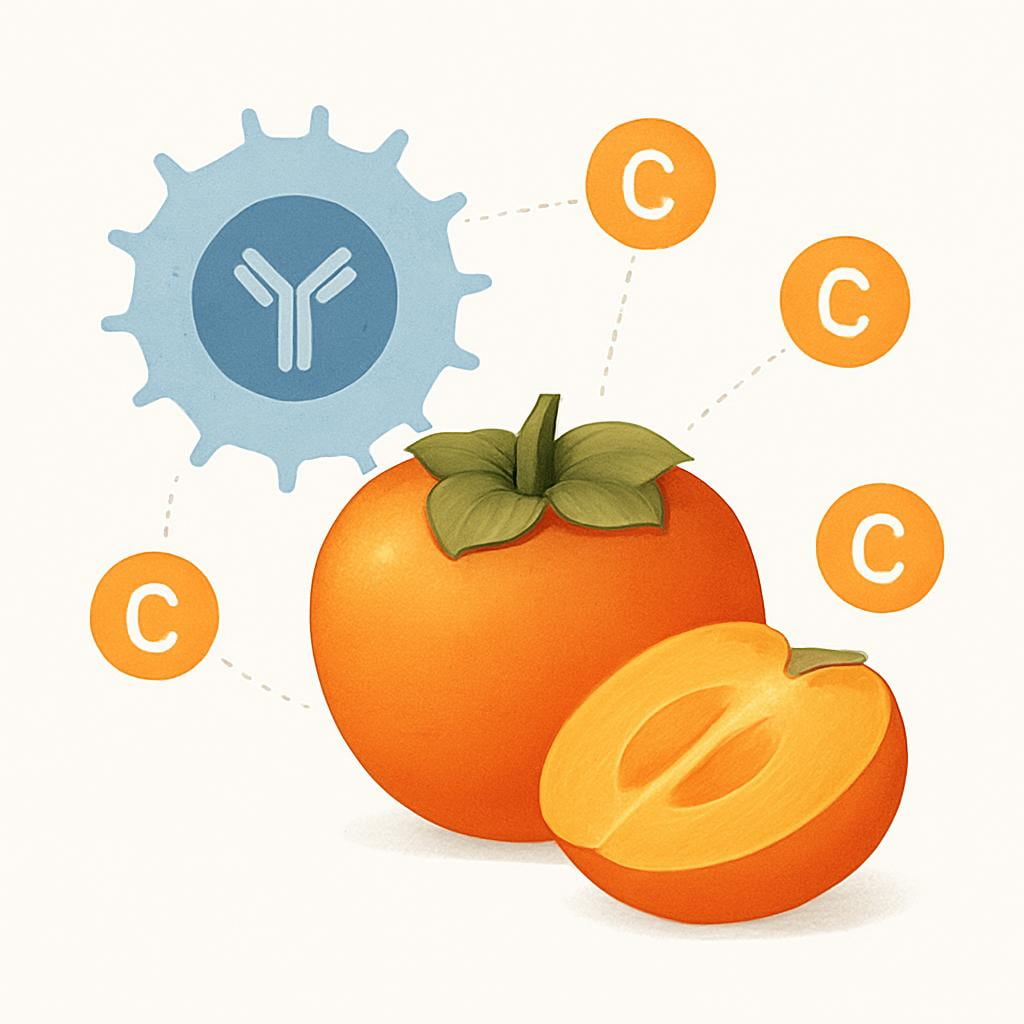
Persimmons contain vitamin C, an essential nutrient that helps the body produce white blood cells and strengthens immune defenses. One medium fruit provides about 14% of the daily value (DV).
According to the National Institutes of Health (NIH), vitamin C also supports collagen synthesis for healthy skin and tissue repair. Including vitamin C–rich foods like persimmons, oranges, and bell peppers can help support your body’s natural defense system.
5. Promotes Healthy Vision
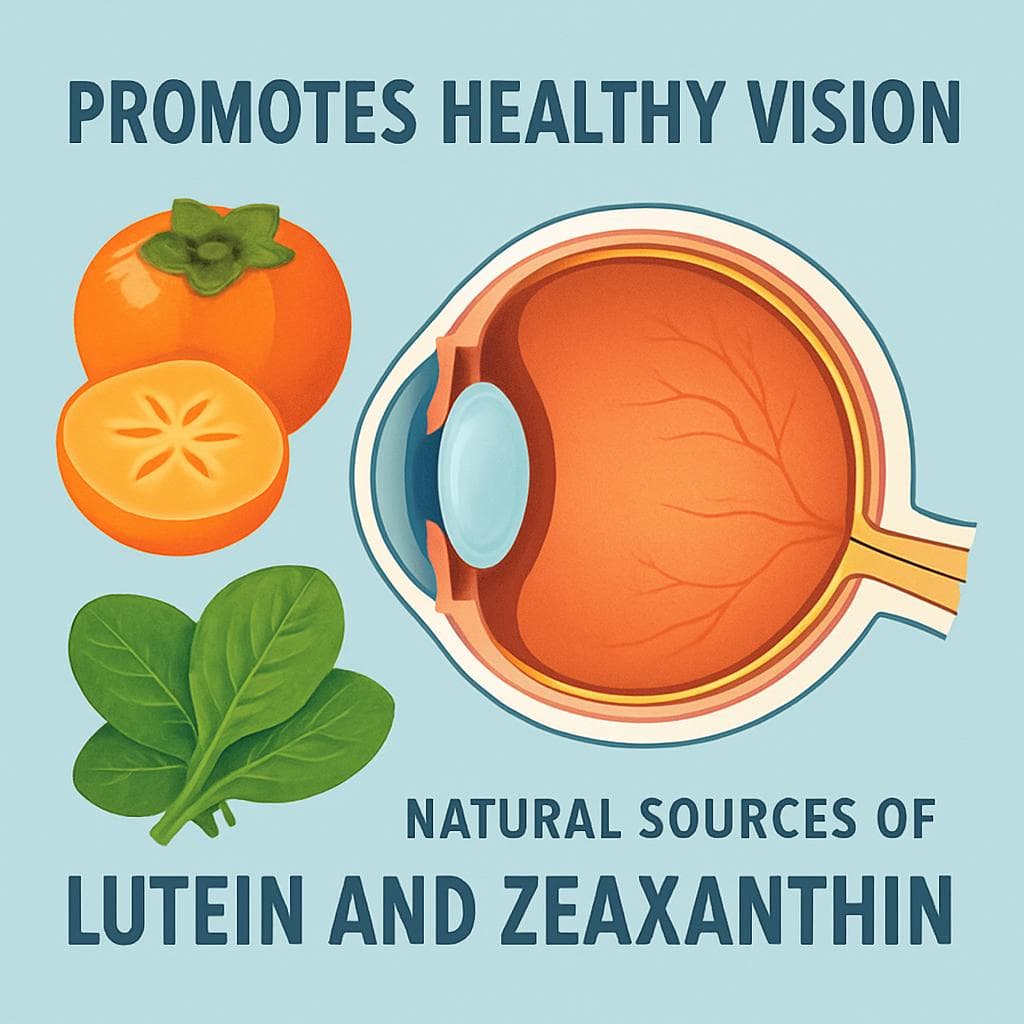
Carotenoids such as lutein and zeaxanthin found in persimmons are known to accumulate in the retina, where they help filter harmful blue light. This may support long-term eye health and normal visual performance.
A review from the American Optometric Association notes that these compounds are associated with supporting macular health and may reduce the risk of age-related vision decline when consumed consistently through food sources.
6. Supports Skin Health

Persimmons are rich in vitamin C and provitamin A (β-carotene)—nutrients that play key roles in maintaining skin structure and radiance. Vitamin C supports collagen production, while carotenoids help protect skin cells from oxidative stress caused by UV exposure.
According to Harvard Health Publishing, consuming antioxidant-rich fruits can support a healthy skin barrier and reduce oxidative effects from environmental stressors.
7. May Help Manage Blood Sugar Levels

Despite their natural sweetness, persimmons have a moderate glycemic index (GI 61–62), and their fiber content helps slow sugar absorption, supporting stable blood sugar levels.
A 2024 review from the Journal of Nutritional Science highlighted that high-fiber fruits like persimmons may help support healthy glucose regulation. For best results, enjoy whole persimmons instead of juices or dried slices, which are higher in natural sugars.
8. Supports Weight Management
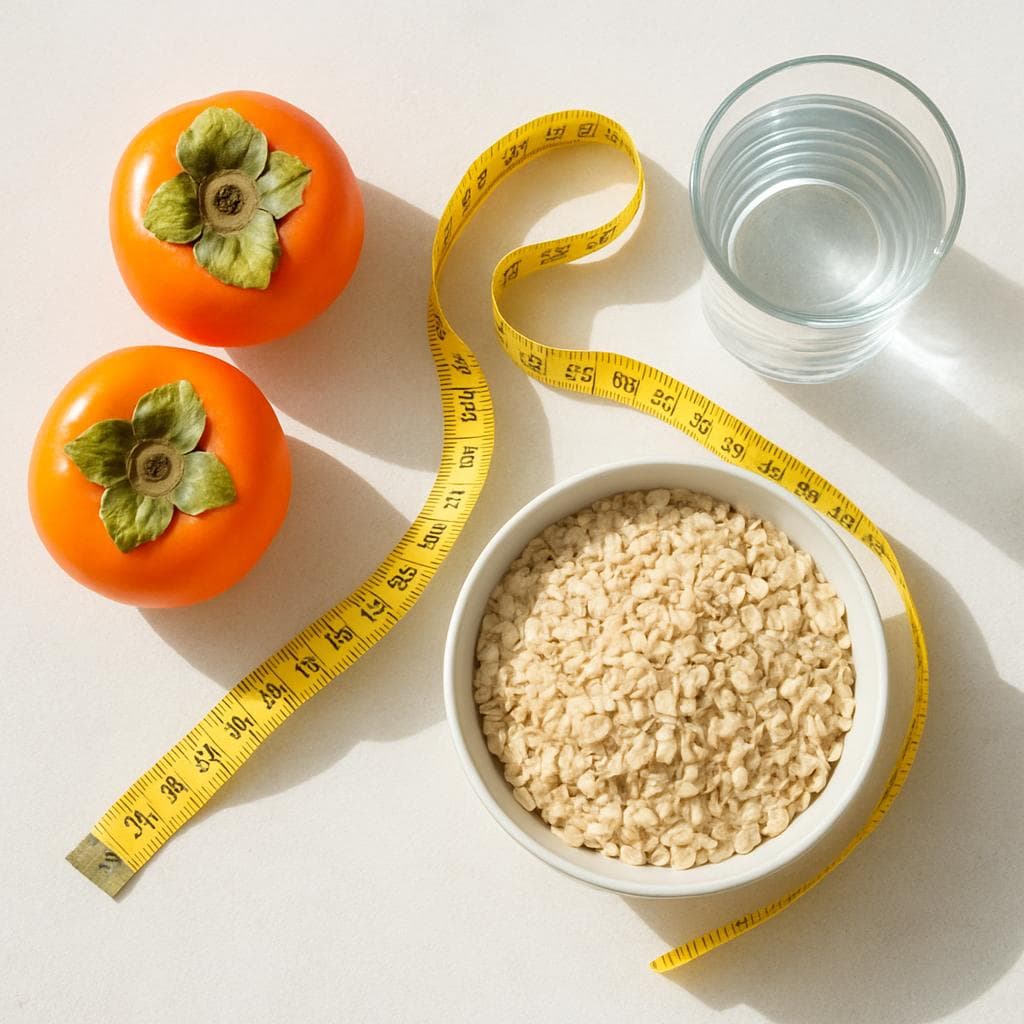
Persimmons may support healthy weight management because their fiber and water content promote a feeling of fullness. Eating fiber-rich fruits may naturally reduce calorie intake by delaying hunger.
A 2024 double-blind, placebo-controlled study published in Clinical Nutrition found that persimmon extract improved body composition and fat distribution in adults with overweight when combined with a balanced diet and exercise.
Including fresh persimmons in smoothies or salads can be a simple, nutrient-rich addition to a calorie-conscious plan.
9. Promotes Healthy Circulation
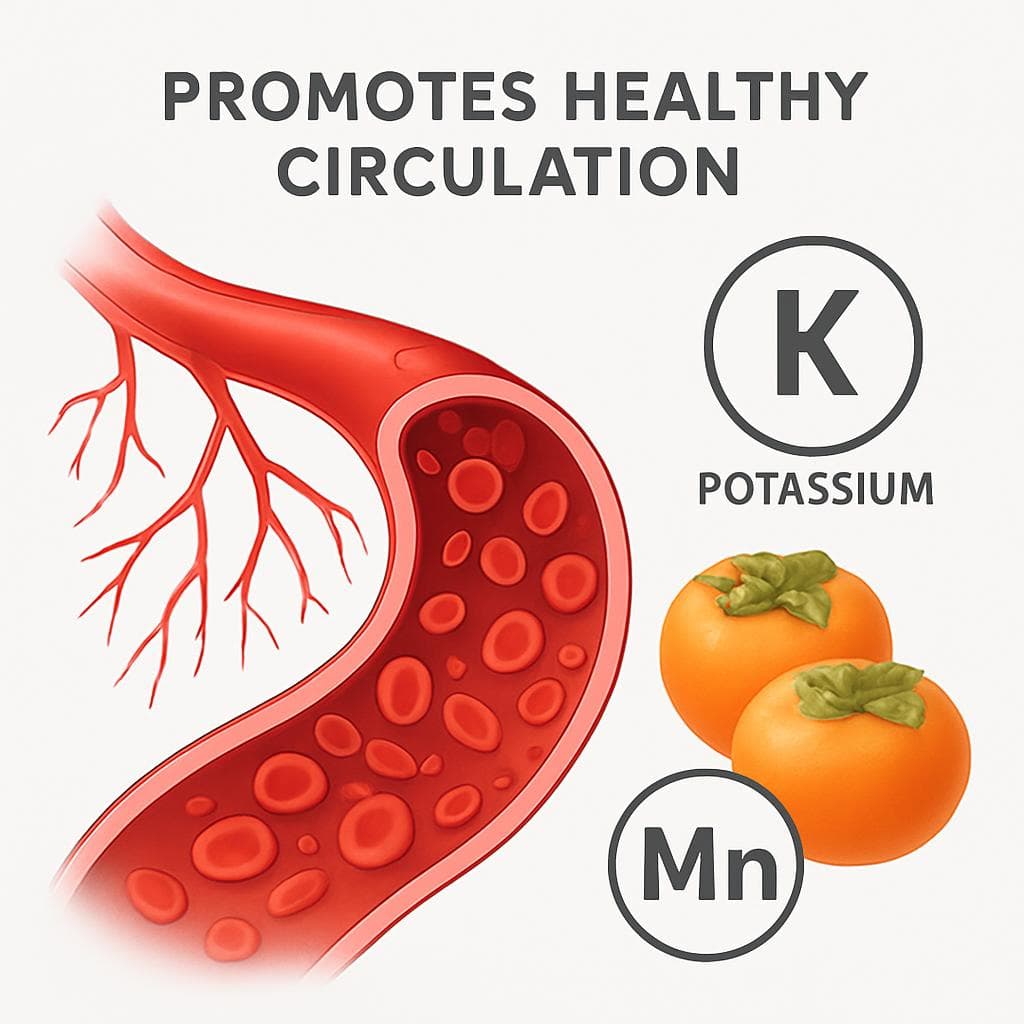
Persimmons supply essential minerals like potassium and manganese, which support normal blood circulation, muscle contraction, and overall cardiovascular health. Potassium helps regulate heartbeat and maintain proper fluid balance in the body, while manganese contributes to energy metabolism and the body’s antioxidant defense system.
According to the Cleveland Clinic, potassium supports fluid balance within cells and helps regulate blood pressure by counteracting the effects of sodium. A diet rich in potassium-containing foods—such as persimmons, bananas, avocados, and leafy greens—may help support normal cardiovascular function and reduce the risk of elevated blood pressure when combined with other healthy lifestyle habits like regular exercise and limited sodium intake.
Including potassium-rich fruits like persimmons as part of a balanced diet may help maintain optimal heart rhythm and support healthy blood vessel function—key factors in overall circulatory wellness.
10. May Support Detoxification
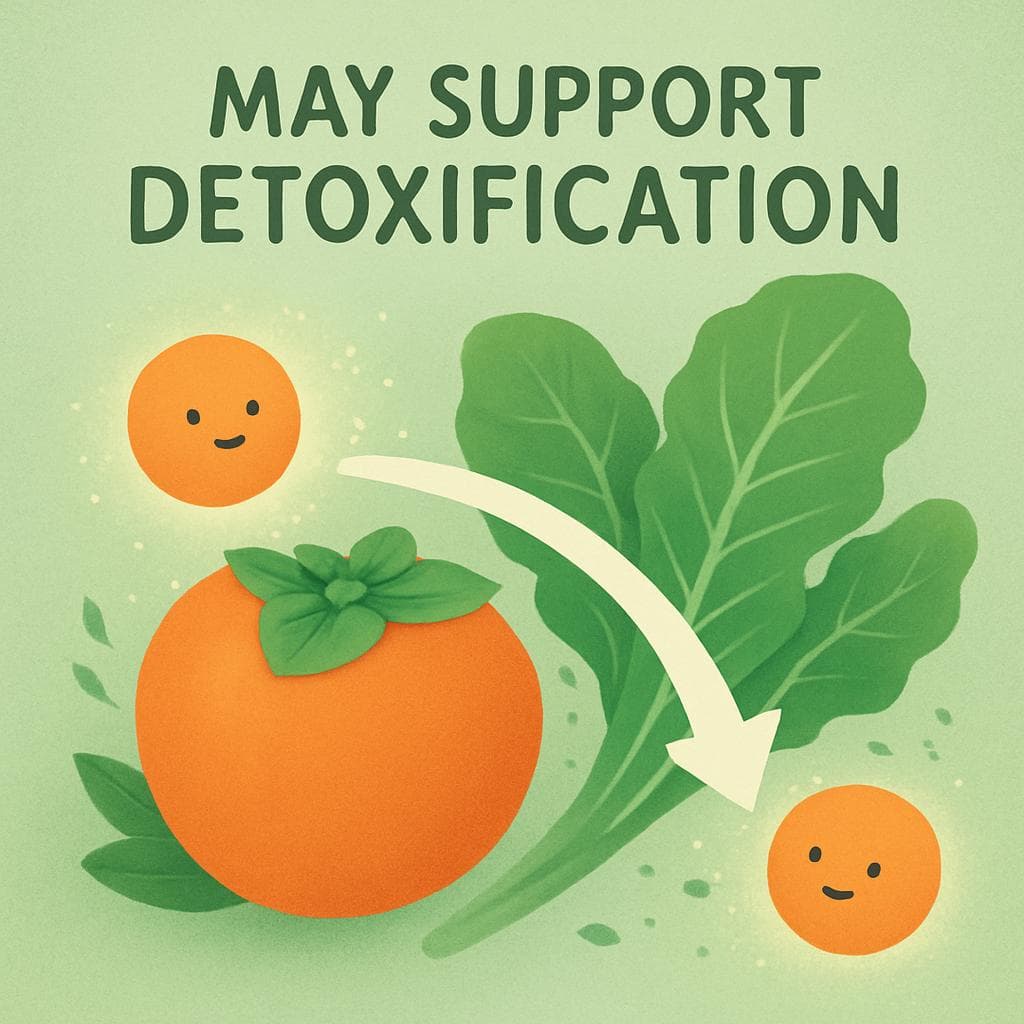
Persimmons contain fiber and antioxidants that support the body’s natural detoxification pathways. The fiber aids digestion and elimination of waste, while antioxidants like β-cryptoxanthin and tannins help reduce oxidative stress.
Research in the Journal of Agricultural and Food Chemistry (2024) notes that persimmon peel and pulp contain polyphenols that may help protect the liver from oxidative damage in preclinical models.
While not a “detox” product, persimmons can be part of a balanced diet that naturally supports the body’s cleansing processes.
Possible Side Effects and Precautions
While persimmons are nutritious and generally safe for most people, there are a few important health precautions to consider—especially for individuals with digestive sensitivities, allergies, or metabolic conditions. Understanding these potential side effects helps ensure safe and balanced consumption.
1. Bezoar Risk (Digestive Blockages)
Unripe or astringent persimmons contain high levels of tannins, natural compounds that can react with stomach acid to form phytobezoars—solid masses of indigestible material that, in rare cases, may block the passage of food from the stomach to the intestine. This condition, known as gastric outlet obstruction, can cause abdominal pain, bloating, nausea, or vomiting.
According to the Cleveland Clinic, bezoars are among the recognized causes of gastric outlet obstruction, especially in individuals with diabetes-related delayed stomach emptying (gastroparesis) or those who have undergone stomach surgery.
To minimize this risk, always eat fully ripe persimmons—especially for Hachiya varieties, which are highly astringent when unripe. Limit consumption to moderate portions, chew thoroughly, and pair persimmons with other fiber sources to aid digestion. People with digestive disorders or previous gastric surgery should consult their healthcare provider before consuming large quantities of persimmons.
Eating soft, ripe persimmons not only enhances flavor but also supports safer digestion and better nutrient absorption.
2. Latex–Fruit Allergy (Cross-Reactivity)
Some individuals with latex or birch pollen allergies may experience mild reactions to persimmons due to shared proteins that can trigger latex–fruit syndrome. Symptoms may include itching, swelling, or mild oral allergy sensations.
If you have known allergies, consult your healthcare provider before adding persimmons to your diet. The Mayo Clinic emphasizes that food-related allergies can vary widely in severity and should always be approached cautiously.
3. Blood Sugar Considerations
Persimmons are naturally sweet fruits, providing about 21 grams of natural sugar per medium-sized serving. Their dietary fiber content helps slow down glucose absorption, supporting steadier post-meal blood sugar levels. However, eating too many at once can still raise blood glucose—particularly in people with diabetes, prediabetes, or insulin resistance.
According to the Harvard Health Publishing, foods with a moderate glycemic index (GI of 56–69), such as persimmons, can be safely included in a healthy diet when eaten in moderation and balanced with protein or healthy fats. Pairing persimmons with yogurt, nuts, or oatmeal can help slow digestion and stabilize energy levels throughout the day.
Safe guidance:
- Enjoy one medium ripe persimmon at a time and avoid overconsumption of dried or juiced forms, which contain concentrated sugars and reduced fiber.
- Combine persimmons with high-protein or high-fiber foods (like Greek yogurt, almonds, or chia seeds) to help moderate glycemic response.
- For those monitoring blood sugar, check post-meal glucose readings to understand personal tolerance.
When eaten in moderation and as part of a balanced diet, persimmons offer natural sweetness, vitamins, and antioxidants—making them a wholesome alternative to processed desserts while maintaining mindful control of blood sugar levels.
4. Medication Absorption
High-fiber foods, including persimmons, are beneficial for digestion and heart health—but their fiber content can temporarily reduce the absorption of certain medications if taken at the same time. This interaction occurs because fiber slows the movement of food and substances through the digestive tract, which may affect how quickly and effectively a medication is absorbed into the bloodstream.
According to the Cleveland Clinic, dietary fiber helps regulate digestion but can also interfere with how the body processes certain oral medications—particularly thyroid medications (like levothyroxine), iron supplements, and some antibiotics.
Safe guidance:
- Take prescription medications at least one hour before or two hours after eating fiber-rich foods such as persimmons, whole grains, or legumes.
- Maintain a consistent schedule for both meals and medication timing to avoid absorption fluctuations.
- If you’re prescribed iron or thyroid medication, consult your doctor or pharmacist for personalized timing recommendations, as fiber intake can vary day to day.
When managed properly, persimmons can remain a healthy part of your diet while ensuring your medications work as intended. Always follow your healthcare provider’s advice when balancing medication schedules with dietary fiber intake.
5. Digestive Discomfort from Unripe Fruit
Unripe Hachiya persimmons contain tannins that can cause dryness in the mouth or mild constipation. The National Institutes of Health (NIH) MedlinePlus notes that adequate hydration and ripe fruit selection can help support comfortable digestion.
Safe Summary:
- Eat persimmons fully ripe to avoid astringency and discomfort.
- Limit intake to one medium fruit per day for balanced nutrition.
- People with latex allergies, diabetes, or digestive issues should consult their healthcare provider before frequent consumption.
When consumed properly, persimmons are a safe, nutrient-rich fruit that supports overall wellness.
How to Eat Persimmons Safely
Persimmons can be enjoyed fresh, dried, or cooked—but preparation and ripeness determine taste, texture, and digestive comfort.
Fuyu vs. Hachiya: Which to Choose
- Fuyu Persimmons: Round, crisp, and mildly sweet; can be eaten firm like an apple.
- Hachiya Persimmons: Longer and pointed; must be fully soft (jelly-like) before eating to avoid astringency.
- Tip: To speed ripening, store unripe Hachiyas in a paper bag with a banana for 1–2 days at room temperature.
Both varieties are nutrient-dense and provide similar antioxidant and fiber benefits when ripe.
Best Ways to Add to Meals (Salads, Smoothies, Baking)

- Slice fresh Fuyu persimmons into autumn salads with spinach, walnuts, and goat cheese.
- Blend into smoothies with banana, Greek yogurt, and cinnamon.
- Use ripe Hachiya pulp in muffins, pancakes, or puddings for natural sweetness.
- Combine with chia seeds or oats for a fiber-rich breakfast bowl.
Avoid overconsumption; one medium fruit per day provides ample nutrients without excessive sugar.
Storage and Food Safety Tips
Proper storage maintains freshness, flavor, and nutritional integrity.
- Ripening: Keep unripe persimmons at room temperature until soft.
- Refrigeration: Once ripe, store in the refrigerator at ≤ 40 °F (4 °C). Consume within 7–10 days.
- Freezing: Peel, slice, and store in airtight containers for up to 3 months.
- Food Safety: Wash persimmons under running water before eating to remove residue.
According to the U.S. Department of Agriculture (USDA) Food Safety and Inspection Service, maintaining refrigerator temperatures at or below 40 °F helps prevent bacterial growth and preserve fruit quality.
Where to Buy and Current Pricing (2025 U.S.)
Persimmons are in season from October to February across most U.S. grocery retailers and online platforms. Prices vary by variety and certification (organic vs. conventional).
| Type | Average Price (2025) | Retailer / Source |
|---|---|---|
| Fuyu Persimmons (Fresh, per lb) | $2.89 – $3.25 | Whole Foods, Walmart, Amazon Fresh |
| Hachiya Persimmons (Fresh, per lb) | $3.10 – $3.50 | Sprouts, Kroger, Local Farmers Markets |
| Dried Persimmons (Organic, 16 oz) | $11.99 – $13.49 | Thrive Market, Amazon |
| Persimmon Puree (Frozen, 8 oz) | $4.49 | Whole Foods / Asian Grocery Retailers |
Look for labels such as “USDA Organic,” “Cold-Pressed,” or “Not-from-Concentrate” for better quality assurance.
Frequently Asked Questions (FAQs)
1. Are persimmons safe for diabetics?
Yes, in moderation. Whole persimmons contain fiber that supports blood sugar balance, but portion control is key for people managing diabetes.
2. Can I eat persimmon skin?
Yes. The skin is edible and contains antioxidants, but it should be thoroughly washed before consumption.
3. What happens if you eat an unripe persimmon?
Unripe persimmons are astringent and may cause a dry, puckering sensation or mild digestive discomfort due to tannins.
4. How many persimmons can you eat daily?
One medium fruit per day is generally considered a healthy serving for most adults.
5. Are persimmons good during pregnancy?
Yes, when eaten ripe and in moderation. Persimmons provide vitamin C, folate, and fiber that support maternal nutrition. Always consult a healthcare provider for personalized advice.
6. Can persimmons interact with medications?
High-fiber foods may slow absorption of certain medications. Take them at least one hour apart unless advised otherwise by your healthcare professional.
7. Are dried persimmons as healthy as fresh ones?
Dried persimmons are more concentrated in sugar and calories, so consume smaller portions for balanced intake.
Conclusion
Persimmons are nutrient-rich fruits that support heart, digestive, immune, and eye health when eaten ripe and in moderation. Their high fiber and antioxidant content make them a valuable addition to a balanced diet. To ensure safe consumption, choose ripe fruit, store it properly, and observe portion control—especially for those with blood sugar concerns or allergies.
This content is for informational purposes only and not medical advice.
References:
